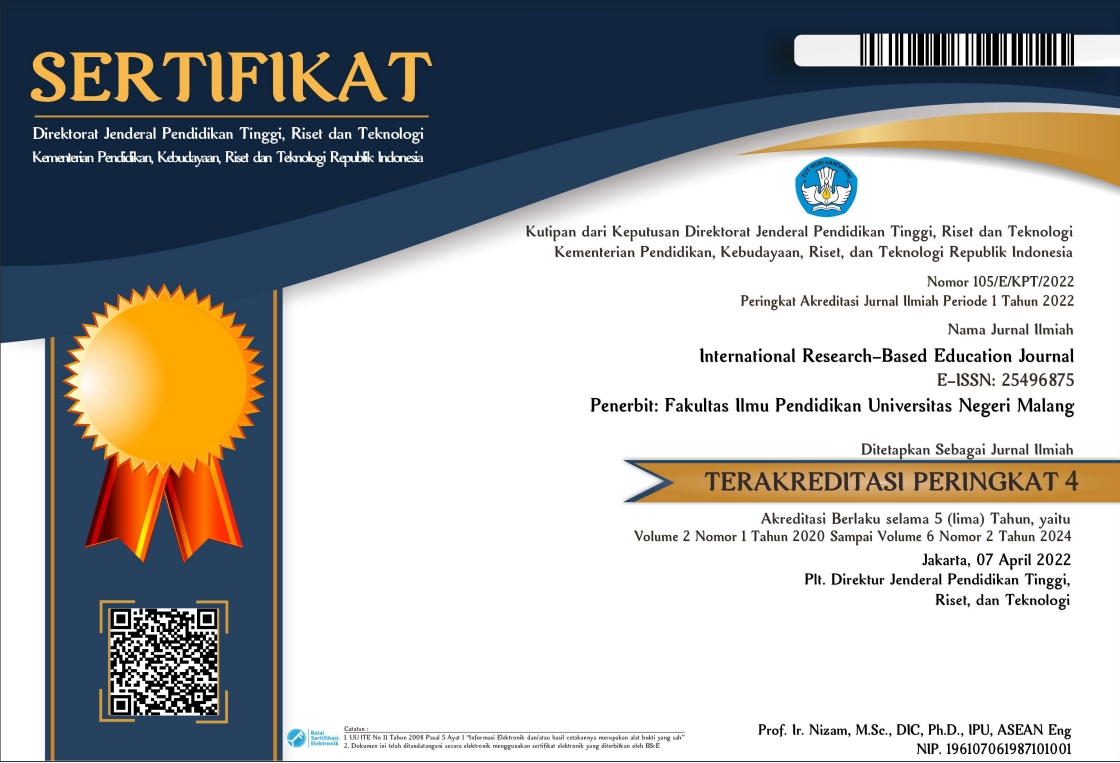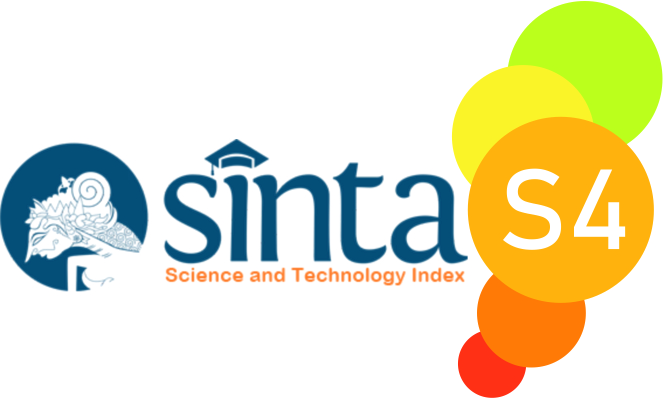Literature Review Study: The Role of Higher Education in Forming Human Resources with Character and Morals in Welcoming Golden Indonesia 2045
Abstract
Keywords
Full Text:
PDFReferences
Ansori, R. W. (2021). Ancangan Indonesia Emas 2045 dalam Buku Teks Bahasa Indonesia Terbitan Kementerian , Pendidikan , dan Kebudayaan Tahun 2017. Jurnal Pendidikan: Riset & Konseptual, 5(4), 551–557.
Aryani, E. D., Fadjrin, N., Azzahro’, T. A., & Fitriono, R. A. (2022). Implementasi Nilai-Nilai Pancasila Dalam Pendidikan Karakter. Gema Keadilan, 9(3). https://doi.org/10.14710/gk.2022.16430
Biner Ambarita. (2014). Pembangunan Karakter Menuju Generasi Emas tahun 2045. Generasi Kampus, 7(1), 1–17.
Brint, Steven. (2016). "Thingking about Schools and Universities as Social Institutions”. Article-Resume. Stanford, CA: Stanford University Press.
Chowdhury, M. (2016). Emphasizing Morals, Values, Ethics, and Character Education in Science Education and Science Teaching. Malaysian Online Journal of Educational Sciences, 4(2), 1–16.
Davis, K. (1990). Human Behavior at Work; Organizational Behavior. New Delhi. Tata McGraw-Hill Publishing.
Hidayat, D., Eltariant, I., Priyatna, R. K., & Fernanda, S. A. (2019). Implementasi Nilai-Nilai Pancasila dalam Mencegah Degradasi Moral Terhadap Isu Sara dan Hoax. Jurnal Rontal Keilmuan PKN, 5(1), 49–56.
Hidayat, N., Sutrisno, S., & Permatasari, T. (2023). Transformasi Sekolah Tinggi Agama Buddha Nalanda menjadi Institut Agama Buddha Nalanda: Tinjauan Studi Kelayakan dalam Konteks Sosial Budaya. Innovative: Journal Of Social …, 3, 4174–4189. http://j-innovative.org/index.php/Innovative/article/view/5331
John W Newstrom, P. . (2007). Organizational Behavior - Human Behavior at Work (12e). In McGraw-Hill/Irwin.
Josephson Institute. Thes Six Pillars of Character. https://charactercounts.org/six-pillars-of-character/ . diunduh tanggal 22 Juni 2024
Kolb, D.A. (1984). "Experiential Learning: Experience as the Source of Learning and Development". Englewood Cliffs, NJ: Prentice Hall. Pages 21-38.
Kustati, M., Kosim, M., Sermal, S., Fajri, S., & Febriani, S. R. (2024). The Model for Maintaining Families with Noble Character During the Pandemic in Kampung KB Villages. Jurnal Ilmiah Peuradeun, 12(1), 1–26. https://doi.org/10.26811/peuradeun.v12i1.1126
Mahmudah, Nur endah. “Optimilizing Character Education In Welcoming Golden Indonesia 2045”. Jurnal Pendidikan dan Humainora, Vol. 7 No. 2. Juli (2023). Hlm 141-151.
Maisaroh, A., & Untari, S. (2024). Transformasi Pendidikan Karakter Melalui Kebijakan Pemerintah Di Indonesia Menuju Generasi Emas 2045. Jurnal Kebijakan Pemerintahan, 7(47), 18–30.
Mentari, Ana, et. al.” Implementasi Pendidikan Karakter di Perguruan Tinggi”. Jurnal Kultur Demokrasi. Vol. 10 No. 1. (2021). Hlm 1-8.
Mohd Yusoff, M. Z., Hamzah, A., Fajri, I., Za, T., & Yusuf, S. M. (2022). The Effect of Spiritual and Social Norm in Moral Judgement. International Journal of Adolescence and Youth, 27(1), 555–568. https://doi.org/10.1080/02673843.2022.2156799
Nasional, D. P. (2003). Kementrian Pendidikan. In Undang-Undang Republik Indonesia (Issue 20).
Nur, R., Truvadi, L., Agustina, R., & Salam, I. (2023). Peran Pendidikan Pancasila dalam Membentuk Karakter Bangsa Indonesia: Tinjauan dan Implikasi. Jurnal Advances in Social Humanities Research, 1(4), 501–510.
Rustandi, Dwi. Humas Ditjen Dikti, Kementerian Pendidikan dan Kebudayaan. Pendidikan Indonesia Menuju Indonesia Emas 2045. Diakses dari web https://dikti.kemdikbud.go.id/kabar-dikti/kabar/pendidikan-indonesia-menuju-indonesia-emas-2045/ pada tanggal 22 Juni 2024.
Sari, Y. M., & Wibowo, U. B. (2019). Existence of Teacher as Educator Who has a Character of Education. 326(Iccie 2018), 538–542. https://doi.org/10.2991/iccie-18.2019.94
Sari, Y. M., & Wibowo, U. B. (2019). Existence of Teacher as Educator Who has a Character of Education. 326(Iccie 2018), 538–542. https://doi.org/10.2991/iccie-18.2019.94
Sudarma, U. (2022). Pendidikan karakter dalam mewujudkan sumber daya manusia berdaya saing menuju Indonesia Emas 2045. Sharia: Jurnal Kajian Islam, 1(1), 37–55. https://doi.org/10.59757/sharia.v1i1.4
Suparno. (2017). “REVOLUSI MENTAL” to build the character of bureaucrats in Indonesia. International Journal of Civil Engineering and Technology, 8(8), 1099–1104.
Manullang, Belferik. “Grand Desain Pendidikan Karakter Generasi Emas 2045”. Jurnal Pendidikan Karakter. Vol. 4, No. 1. (2013). Hlm 1-14.
UNESCO. (2017). "Education for Sustainable Development Goals: Learning Objectives". Paris: UNESCO Publishing. https://unesdoc.unesco.org/ark:/48223/pf0000247444
Walid, Muhammad. “MODEL PENDIDIKAN KARAKTER DI PERGURUAN TINGGI AGAMA ISLAM (Studi tentang Pendidikan Karakter Berbasis Ulul albab di Universitas Islam Negeri Maulana Malik Ibrahim Malang”. Jurnal el-GUDWAH. Vol. 1. No. 5 (2011). Hlm 115-15.
Wahyudin. (2016). Pembangunan Karakter Bangsa Era Soekarno. Elementary, 2(02), 26–36.
WHO. (2024). Youth violence. World Health Organization. https://www.who.int/news-room/fact-sheets/detail/youth-violence
Widjaja, I., & Sihombing, I. N. I. (2020). Karakter Manusia Dilihat Dari Etika Terapan Terhadap Perubahan Diri Seseorang. Didache: Jurnal Teologi Dan Pendidikan Kristiani, 2(1), 37–49. https://doi.org/10.55076/didache.v2i1.42
ZA, Tabrani, et. al. “Pancasila As The Core Value Character Building In Islamic Higher Education Instituions”. The Indonesian Journal of The Social Sciences. Vol. 12, No. 2. (2024).
DOI: http://dx.doi.org/10.17977/um043v7i1p114-124
Refbacks
- There are currently no refbacks.

This work is licensed under a Creative Commons Attribution-NonCommercial-ShareAlike 4.0 International License.










1.png)


